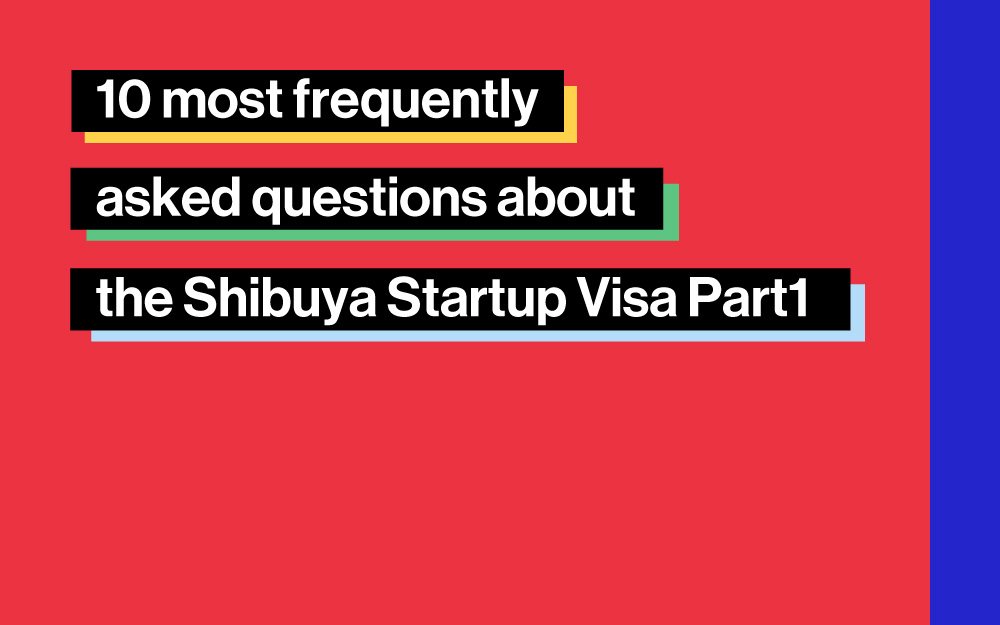10 most frequently asked questions about the Shibuya Startup Visa – Part 1

In the past, the raft of immigration restrictions imposed by the Japanese government has hampered opportunity among foreign-born entrepreneurs. However, recently some local governments have made important policy changes paving the immigration pathway for innovative ideas.
Launched in 2021, Shibuya Startup visa initiative is meant for foreign-born entrepreneurs seeking to establish a new business in Shibuya City, a startup hub of Tokyo. The new 1-year visa is open to all eligible applicants who need to prove through the application documents and the visa interview that they have the relevant qualifications and experience to make new scalable business a success.
Here you can find some of the most frequently asked questions about Shibuya Startup visa answered.
1. Who is eligible for a Shibuya Startup visa?
Foreign-born entrepreneurs, residing in Japan or planning to relocate to Japan, who want to start a business in Shibuya City, and meet certain conditions.
The business idea should meet the entrepreneurial principles of viability, innovation and scalability. The inspection team also assesses how realistic and achievable the business plan is and evaluates why a startup needs to be established in Shibuya and how it will contribute to Shibuya’s ecosystem.
Shibuya City is specifically looking for startups in some specific fields of industry. Here are the fields:
・Health, Medical, Welfare
・Environment/Energy
・Food/Agriculture/Forestry/Fisheries
・Information Technologies
・Culture/Art
・Fashion
2. Do I need to relocate to Shibuya to be eligible for an application?
To be eligible, you should prove that you are planning to set up your office or register your company in Shibuya city. It can be a virtual office or coworking space, but in 12 months, you will need your own space to qualify for the Business Manager Visa.
Your own residential place can be located anywhere in Tokyo. However, if you are interested in our hands-on support when visiting legal institutions, it is recommended to live in or around Shibuya ward.
Please be aware that you need to submit a housing contract to qualify for a Startup visa. If it is difficult to secure a long term contract, your residential plan for the first 2 months will suffice. That being said, you will also need to communicate your plans of residence area after the first 2 months. Fortunately, Shibuya city made exclusive partnerships with several real estate agencies who agreed to ease the housing criteria for foreign-born entrepreneurs.
3. For how long is the Shibuya startup visa valid?
Shibuya Startup visa is issued for a period of six months and could be renewed for another six months that makes it 1 year in total. After one year, the entrepreneurs should switch their visa status to a Business Manager visa.
4. What are the documents to submit?
There are several required documents in order to complete your application. Please visit Shibuya City Office’s “Startup Visa” page for the detailed information about these documents:
・Application form
・Implementing Plan
・Process chart of entrepreneurial activities
・CV
・Affidavit
・Document that guarantees your place of residence for six-months after arriving in Japan
・(copy of rental contract, or application for rental contract, etc.)
・Document that shows your bank account balance (copy of your bank book)
・Document that verifies the content of required documents such as certification from school, contract with previous companies you work and etc.,
・Copy of your passport
・Other documents that allow us to understand your business plan or yourself.
Not required but will definitely increase your chances to get approved:
・Pitch Deck for investors
・Contract with Japanese companies
・Detail of the product (demo product, β ver)
・Fundraising plan
5. Is the Startup Visa extendable to other team members?
Your co-founder may also apply for a Startup visa, however he/she should submit a separate application. Submitting the same business plan and list of documents for the company’s activities is acceptable, but each applicant has to show a bank statement with over JPY 5M to qualify. In addition, there should be a reasonable reason to co-found the company and apply for two startup visas. Make sure that the co-founders need to work on different roles in the company in order to make the business successful.
If you want to bring a non-core team member from abroad, you’ll need to sponsor his/her appropriate working visa after you successfully set your business in Japan. There are also some conditions that you as an employer must meet, such as financial performance.
Read 10 most frequently asked questions about the Shibuya Startup Visa – Part 2 here

